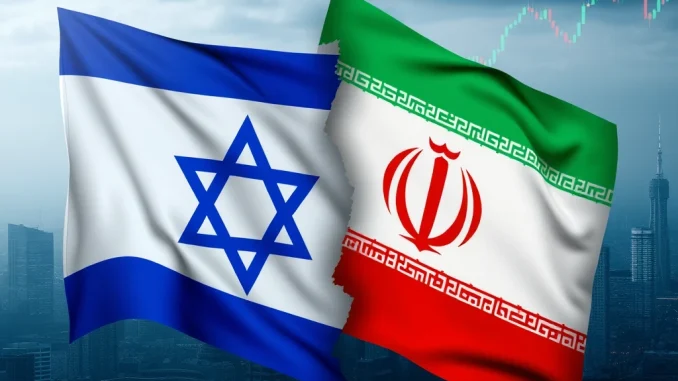
The world is watching the Middle East closely following reports that Iran is preparing a ‘harsh response’ to a recent Israeli strike. This development, according to an Iranian security source speaking to Reuters (as reported by Jin10.com), injects a new level of uncertainty into an already volatile region. For those navigating the global markets, including the dynamic world of cryptocurrencies, understanding the potential ripple effects of rising `geopolitical tension` is crucial.
Understanding the Reported `Iran Israel Conflict`
The initial report is concise but carries significant weight. An Iranian security official has reportedly informed Reuters that plans are underway for a substantial retaliation against Israel. While the specifics of the planned ‘harsh response’ remain undisclosed, the statement itself signals a clear intent to escalate following a strike attributed to Israel. The strike in question is widely believed to be the bombing of Iran’s consulate in Damascus, Syria, earlier this month, which resulted in the deaths of senior Iranian military commanders.
This isn’t a new rivalry, but this particular incident and the subsequent warning mark a potentially dangerous turn. Here are a few points to consider about the context:
- Proxy Conflict: Iran and Israel have long engaged in a shadow war, often through proxies in countries like Syria, Lebanon, and Yemen.
- Direct Attack: The Damascus strike was significant because it targeted Iranian officials directly in a diplomatic compound, which Iran views as its sovereign territory.
- Public Warning: While threats are common, a direct warning of a ‘harsh response’ through a major news agency suggests a deliberate signal of intent.
How Does `Geopolitical Tension` Affect Global Markets?
Increased tension between major regional players like Iran and Israel rarely stays confined to their borders. Global financial markets are highly interconnected, and uncertainty in a critical region like the Middle East can have widespread effects. Historically, periods of elevated geopolitical risk tend to influence markets in predictable ways:
Here’s a simplified view:
| Asset Class | Typical Reaction to Tension | Reasoning |
|---|---|---|
| Oil Prices | Often Rise | Middle East is a major oil production region; supply disruption fears. |
| Stock Markets | Often Fall (Short-term) | Increased uncertainty, risk aversion, potential impact on global trade/economy. |
| Government Bonds (e.g., US Treasuries) | Often Rise (Prices), Yields Fall | Seen as ‘safe haven’ assets; investors seek security. |
| Gold | Often Rises | Traditional ‘safe haven’ asset during uncertainty and inflation fears. |
While these are typical reactions, the actual impact depends on the severity and nature of the escalation.
Exploring the Potential `Middle East Conflict` Scenarios and Their Reach
What might a ‘harsh response’ entail? Speculation ranges from increased proxy attacks to potential direct action. The key concern is escalation – a cycle of retaliation that spirals into a broader conflict. A significant `Middle East conflict` could have far-reaching consequences:
- Disruption of shipping lanes, particularly in vital areas like the Strait of Hormuz.
- Increased cyberattacks.
- Impacts on global energy supply and prices.
- Further destabilization of neighboring countries.
Any of these scenarios could send ripples through the global economy and financial systems.
What is the Potential `Market Impact` on Cryptocurrency?
The relationship between geopolitical events and the crypto market is complex and debated. Unlike traditional assets with clear historical reactions, cryptocurrency’s role is still evolving. However, we can consider potential impacts:
- Increased Volatility: Geopolitical shocks almost always lead to heightened `crypto volatility`. Prices can react sharply to news, sometimes mirroring traditional risk-on/risk-off movements, sometimes moving independently.
- Safe Haven Narrative: Some argue that Bitcoin, due to its decentralized nature and limited supply, could act as a ‘digital gold’ or safe haven during times of traditional market turmoil or inflation driven by conflict.
- Risk Asset Correlation: Conversely, during periods of broad market panic, crypto has often correlated with tech stocks and other risk assets, seeing sell-offs as investors cash out across the board.
- Uncertainty Premium: Increased global uncertainty can sometimes drive interest in alternative assets outside of traditional financial systems, potentially benefiting crypto in the long term, but leading to short-term price discovery and volatility.
It’s difficult to predict with certainty how crypto markets will react to this specific tension, but preparing for increased price swings is prudent.
Navigating `Crypto Volatility` Amidst Geopolitical Storms
For crypto investors, news of rising tensions like the reported ‘harsh response’ plan should serve as a reminder to review their strategies. Here are a few actionable insights:
- Stay Informed: Monitor reliable news sources regarding the situation and its potential global economic fallout.
- Review Your Portfolio: Assess your risk tolerance. Are you comfortable with potential significant price swings?
- Avoid Panic Selling/Buying: Emotional decisions during volatile times often lead to losses. Stick to your pre-defined investment plan.
- Consider Diversification: While crypto is one asset class, ensuring your overall investment portfolio is diversified across different assets can help mitigate risk.
- Understand the Asset: Remember why you invested in crypto in the first place. Does the geopolitical context change the fundamental long-term case for the assets you hold?
Geopolitical events add layers of complexity to market analysis. While the direct link between a specific Middle East tension and the price of Bitcoin or Ethereum isn’t always immediate or clear-cut, the overall climate of global uncertainty it creates is a significant factor for all markets.
Conclusion: Staying Vigilant in Uncertain Times
The report of Iran preparing a ‘harsh response’ to the Israeli strike is a serious development that underscores the current high level of `geopolitical tension` in the Middle East. While the immediate market reaction, including in the crypto space, can be unpredictable, the potential for increased `market impact` and `crypto volatility` is real. Investors should remain vigilant, stay informed about the evolving situation, and approach their portfolios with caution and a focus on their long-term strategy rather than reacting impulsively to headlines about the `Iran Israel conflict` or broader `Middle East conflict`. The coming days will be critical in determining whether this reported plan leads to further escalation or remains a strong rhetorical warning.



